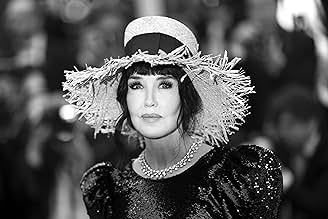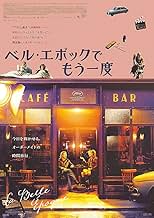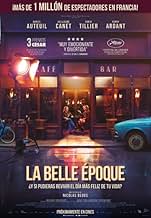VALUTAZIONE IMDb
7,4/10
21.188
LA TUA VALUTAZIONE
Una coppia in crisi. Disilluso, Victor vede la sua vita sconvolta il giorno in cui un imprenditore gli offre l'opportunità di immergersi nel momento della sua scelta.Una coppia in crisi. Disilluso, Victor vede la sua vita sconvolta il giorno in cui un imprenditore gli offre l'opportunità di immergersi nel momento della sua scelta.Una coppia in crisi. Disilluso, Victor vede la sua vita sconvolta il giorno in cui un imprenditore gli offre l'opportunità di immergersi nel momento della sua scelta.
- Regia
- Sceneggiatura
- Star
- Premi
- 6 vittorie e 22 candidature totali
Bruno Raffaelli
- Maurice
- (as Bruno Raffaelli de la Comédie Française)
- …
Recensioni in evidenza
I'd thought of writing a long, involved review of this one, concentrating on the plot antecedents, but what's the use? It's so much fun watching this comedy with dramatic touches that my critical sense is forgotten. Daniel Auteuil is splendid as Victor, and he makes the comic transitions from scene to scene very well. Fanny Ardant changes from sourly critical to warmly emotional as needed--haven't seen her as good at comedy since 8 Women. That's all; I hope to see it again on video.
La Belle Époque poses the interesting question of which moment of your life you'd want to relive (if any). Victor Drumond (Daniel Auteuil), an aging cartoonist with a failing marriage with his wife Marianne (the elegant Fanny Ardant), definitely has one.. one where he first met the love of his life (Marianne, of course!). When Victor gets chucked out of their apartment one night by Marianne, he decides to make use of the voucher offered by his son to "return to his glorious '70s". This is made possible by Antoine (a childhood friend of his son's), who along with a bunch of sophisticated actors and authentic aesthetics (akin to elaborately done film sets), offers a service to let people relive their happiest moment(s).
Antoine (Canet) is going through a relationship struggle with Margot (a tough-to-take-eyes-off Doria Tillier), one of his actresses. When Margot is cast to play the role of Marianne in Victor's moment re-enactment (set in a cafe in Lyon, 1974), things slowly spiral out of control. Victor can't help but fall in love with this beautiful, trailblazing lady (who improvises her lines and situations) for real. In her, he sees traits of his wife, but with unique texturing of her own. As days progress, Victor finds that he's able to draw (i.e. create art) again.
Nicolas Bedos strongly projects how art is one of the few things that can stand the test of time - sometimes, even love tends to take a backseat. He also leaves a heartwarming message (for everyone who's been in love at some point) in the form of the climax scene. It's a nostalgia-filled ride too, into an imagined version of the 70s. Victor casually comments on the times when people used to smoke like they owned chimney lungs and notice other people passing by instead of staring into phone screens (like we do now!).
Plenty of sharp, cleverly written humor is also present for discerning viewers. Bedos can feel proud of the fact that he didn't overly sentimentalize the proceedings or overuse his unique rom-com concept. The writing here for each of the lead characters is solid and very Kaufman-esque in its world-building. I, for one, would love to visit Utopia as many times as possible. Also, I feel uber tempted to check out Doria Tillier's other works ASAP!
Antoine (Canet) is going through a relationship struggle with Margot (a tough-to-take-eyes-off Doria Tillier), one of his actresses. When Margot is cast to play the role of Marianne in Victor's moment re-enactment (set in a cafe in Lyon, 1974), things slowly spiral out of control. Victor can't help but fall in love with this beautiful, trailblazing lady (who improvises her lines and situations) for real. In her, he sees traits of his wife, but with unique texturing of her own. As days progress, Victor finds that he's able to draw (i.e. create art) again.
Nicolas Bedos strongly projects how art is one of the few things that can stand the test of time - sometimes, even love tends to take a backseat. He also leaves a heartwarming message (for everyone who's been in love at some point) in the form of the climax scene. It's a nostalgia-filled ride too, into an imagined version of the 70s. Victor casually comments on the times when people used to smoke like they owned chimney lungs and notice other people passing by instead of staring into phone screens (like we do now!).
Plenty of sharp, cleverly written humor is also present for discerning viewers. Bedos can feel proud of the fact that he didn't overly sentimentalize the proceedings or overuse his unique rom-com concept. The writing here for each of the lead characters is solid and very Kaufman-esque in its world-building. I, for one, would love to visit Utopia as many times as possible. Also, I feel uber tempted to check out Doria Tillier's other works ASAP!
Nicolas Bedos' La Belle Époque has distinctive French flavor and is somewhat old-fashioned.
The film is really light-hearted and is all about love.
And yet it is fascinating and can easily bring you to tears.
Many viewers may recognize Nicolas Bedos in the movies like Love Is in the Air (Amour et turbulences) or Love Lasts Three Years (L'Amour dure trois ans). Still, he is first and foremost a writer and a director, and he is as good at those crafts as in the romantic films being an actor.
His new film combines drama and comedy, restraint and passion, romance and real life.
The main characters of the film are Victor, an illustrator, and Marianne, a psychologist. Both of them are not young, but have completely different outlooks. Victor is stuck somewhere in the distant past, whereas his wife Marianne still wants to take more from life.
The film constantly maintains a fast emotional pace. The tension becomes palpable. The relationships of the couple are on the verge of collapse. They are drifting apart being constantly annoyed. It seems that they just do not want to be close any more, but they might as well not realize how much they really want to be together. Nobody wants to concede and they have to decide whether they are moving on together or separately.
Perhaps, when everything goes wrong it is worth recalling how it used to be. What were you like, what were you both like? In such a way you might revive some stimulating ideas, your love or just find yourself. The only thing you need is a small push.
Victor has got a chance to check it out. His son gave him a present - an incredible journey into the past. He can choose any era and the team of professionals will transfer him to the chosen place and time.
The puppeteer of the business which aims at bringing hope is Antoine (Guillaume Canet). He is a sheer perfectionist who creates authentic historical installations where you can meet Napoleon, Maupassant, or even your own deceased father.
Such an expert would surely have been welcomed in the Ridley Scott's crew when filming Gladiator or Quentin Tarantino's crew when making Inglourious Basterds. However, taken into account Antoine's temper, they would probably have not got along. Just like Antoine's team can hardly stand his annoying behavior.
Antoine is ready to fulfill any of Victor's whim. The latter has chosen to travel back in time into his own past, namely the day he met the love of his life. It was the time when he was breathing freely; he was drawing and was the person he wanted to be.
Someone might find such choice a bit weird. Nevertheless, the main hero has made a decision to live his life again, to make up for the lost time. And the big game starts.
At first, Victor is amused by small inaccuracies of what is going on around him. However, in some time he becomes engrossed into this fictitious world. A completely innocent, at first glance, the game grows into something much bigger.
Victor changes. A fire lights up in his eyes again. He starts a struggle with himself without being fully conscious of that.
Leading this fight you need to stop in time and understand that whiskey is not as tasty as it could be because instead of it you are drinking water. Love is present not only in that one specific day, but it is also inside us.
In La Belle Époque, the characters quarrel and reconcile, love and hate, admire and despise. Despite that, love is prevalent in the given chain of emotions. It is the key even if you need to create the whole new world to save or find it.
The film is really light-hearted and is all about love.
And yet it is fascinating and can easily bring you to tears.
Many viewers may recognize Nicolas Bedos in the movies like Love Is in the Air (Amour et turbulences) or Love Lasts Three Years (L'Amour dure trois ans). Still, he is first and foremost a writer and a director, and he is as good at those crafts as in the romantic films being an actor.
His new film combines drama and comedy, restraint and passion, romance and real life.
The main characters of the film are Victor, an illustrator, and Marianne, a psychologist. Both of them are not young, but have completely different outlooks. Victor is stuck somewhere in the distant past, whereas his wife Marianne still wants to take more from life.
The film constantly maintains a fast emotional pace. The tension becomes palpable. The relationships of the couple are on the verge of collapse. They are drifting apart being constantly annoyed. It seems that they just do not want to be close any more, but they might as well not realize how much they really want to be together. Nobody wants to concede and they have to decide whether they are moving on together or separately.
Perhaps, when everything goes wrong it is worth recalling how it used to be. What were you like, what were you both like? In such a way you might revive some stimulating ideas, your love or just find yourself. The only thing you need is a small push.
Victor has got a chance to check it out. His son gave him a present - an incredible journey into the past. He can choose any era and the team of professionals will transfer him to the chosen place and time.
The puppeteer of the business which aims at bringing hope is Antoine (Guillaume Canet). He is a sheer perfectionist who creates authentic historical installations where you can meet Napoleon, Maupassant, or even your own deceased father.
Such an expert would surely have been welcomed in the Ridley Scott's crew when filming Gladiator or Quentin Tarantino's crew when making Inglourious Basterds. However, taken into account Antoine's temper, they would probably have not got along. Just like Antoine's team can hardly stand his annoying behavior.
Antoine is ready to fulfill any of Victor's whim. The latter has chosen to travel back in time into his own past, namely the day he met the love of his life. It was the time when he was breathing freely; he was drawing and was the person he wanted to be.
Someone might find such choice a bit weird. Nevertheless, the main hero has made a decision to live his life again, to make up for the lost time. And the big game starts.
At first, Victor is amused by small inaccuracies of what is going on around him. However, in some time he becomes engrossed into this fictitious world. A completely innocent, at first glance, the game grows into something much bigger.
Victor changes. A fire lights up in his eyes again. He starts a struggle with himself without being fully conscious of that.
Leading this fight you need to stop in time and understand that whiskey is not as tasty as it could be because instead of it you are drinking water. Love is present not only in that one specific day, but it is also inside us.
In La Belle Époque, the characters quarrel and reconcile, love and hate, admire and despise. Despite that, love is prevalent in the given chain of emotions. It is the key even if you need to create the whole new world to save or find it.
I really enjoyed watching this movie. It's fresh and keeps the viewers well connected with the characters. Exceptional acting. It makes the viewer appreciate the true power of performing a movie within a movie. A clever script, in my oppinion, with a blend of old and new to match. For me, though, it would've been even more gripping if the reenactment had taken place at Marianne's request, rather than Victor's choice. That way, he could've been unaware of everything going on behind the scene, so they can relive their happiest moments, as an attempt to save their marriage. Too cliche? Maybe. Anyway, that's just a thought. I like it all the same.
Aging Victor is down on his luck: he's unemployed and he has been kicked out of his own home as his wife has left him for his former boss, the man who fired him. Then he is offered a chance to recreate a moment in time and he chooses the moment in 1974 when he and his wife first met.
An interesting, entertaining and emotional film. Great in its application of nostalgia and our desires to relive our fondest moments. The central plot is quite basic and ends fairly predictably, though emotionally. However, some of the sub-plots are quite interesting, especially the Antoine-Margot-Victor relationship. There's also some very funny moments: the assistant director gets some great scenes and one-liners.
Not always engaging though. The plot does seem unfocused at times and some scenes and sub-plots go nowhere.
Can't fault the casting: the big names, Daniel Auteuil and Fanny Ardant, are great and nobody puts a foot wrong. Doria Tillier, as Margot, steals the show though.
An interesting, entertaining and emotional film. Great in its application of nostalgia and our desires to relive our fondest moments. The central plot is quite basic and ends fairly predictably, though emotionally. However, some of the sub-plots are quite interesting, especially the Antoine-Margot-Victor relationship. There's also some very funny moments: the assistant director gets some great scenes and one-liners.
Not always engaging though. The plot does seem unfocused at times and some scenes and sub-plots go nowhere.
Can't fault the casting: the big names, Daniel Auteuil and Fanny Ardant, are great and nobody puts a foot wrong. Doria Tillier, as Margot, steals the show though.
Lo sapevi?
- QuizThe caged parrot is named "Mesrine", a reference to Jacques Mesrine, a famous French criminal of the 1960s and 70s who repeatedly escaped from prison.
- BlooperAt the hippie party you can hear the song 'Yes Sir I can boogie', which was released in 1977 , not 1974.
- ConnessioniReferenced in Večernij Urgant: Fanny Ardant/Alexander Ivanov (2019)
I più visti
Accedi per valutare e creare un elenco di titoli salvati per ottenere consigli personalizzati
- How long is La belle époque?Powered by Alexa
Dettagli
- Data di uscita
- Paesi di origine
- Sito ufficiale
- Lingue
- Celebre anche come
- Кафе бажань
- Luoghi delle riprese
- Aziende produttrici
- Vedi altri crediti dell’azienda su IMDbPro
Botteghino
- Lordo in tutto il mondo
- 14.384.206 USD
- Tempo di esecuzione1 ora 55 minuti
- Colore
- Proporzioni
- 2.35 : 1
Contribuisci a questa pagina
Suggerisci una modifica o aggiungi i contenuti mancanti


![Guarda Trailer [English SUB]](https://m.media-amazon.com/images/M/MV5BNzc4YzEzNTYtMzVkOC00NDlmLWI0ODItNTliODNlOWRmOGIxXkEyXkFqcGdeQXRyYW5zY29kZS13b3JrZmxvdw@@._V1_QL75_UY281_CR87)
![Bande-annonce Teaser [OV]](https://m.media-amazon.com/images/M/MV5BNjBlOTQyODUtMTRlNi00MjgyLWIxNjYtYjRhMjRhZjMwOTdmXkEyXkFqcGdeQXRyYW5zY29kZS13b3JrZmxvdw@@._V1_QL75_UX500_CR0)





















